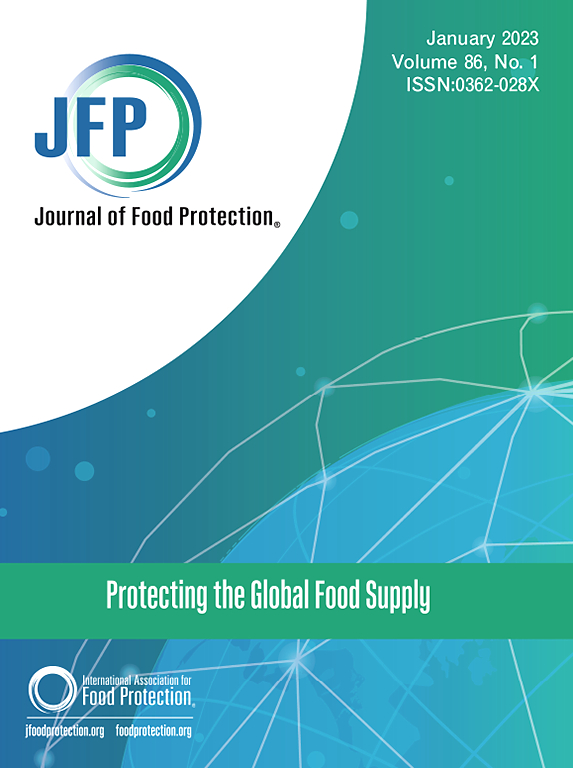苹果在冷藏和臭氧处理过程中李斯特菌替代菌的鉴定。
IF 2.8
4区 农林科学
Q3 BIOTECHNOLOGY & APPLIED MICROBIOLOGY
引用次数: 0
摘要
单核细胞增生李斯特菌在冷藏过程中能够在农产品上存活和生长,对食品安全构成严重威胁。本研究评估了粪肠球菌NRRL B-2354作为单核细胞生长乳杆菌的非致病性替代物,在长达24周的模拟实验室储存和36周的商业储存中,包括冷藏空气(RA),控制气氛(CA),含有1-甲基环丙烯(1-MCP)的CA,有或没有气体臭氧处理。结果表明,粪肠杆菌的死亡模式与单核细胞增多乳杆菌相当,在环境储存18周内,每苹果减少2.5-2.7 log CFU,在4 °C下,24周减少2.7-2.8 log,在RA和CA储存36周后,减少3.4-3.5 log。在臭氧处理下,粪杆菌在CA储存下表现出更大的稳定性。这些结果表明,在冷藏环境中,粪肠杆菌NRRL B-2354是单核增生乳杆菌的合适替代物。24周的低剂量连续气体臭氧处理和12周的CA储存导致李斯特菌每苹果减少约5 log CFU,反映了CA储存下的处理效果和自然死亡。这些结果表明,气态臭氧作为一种可行的干预策略,可以在商业储存过程中控制李斯特菌,并支持在验证冷藏实践中使用粪肠杆菌NRRL B-2354。本文章由计算机程序翻译,如有差异,请以英文原文为准。
Validation of Enterococcus faecium NRRL B-2354 as a Surrogate for Listeria on Apples During Cold Storage and Gaseous Ozone Treatments
Listeria monocytogenes poses a serious food safety risk due to its ability to survive and grow on produce during cold storage. This study evaluates Enterococcus faecium NRRL B-2354 as a nonpathogenic surrogate for L. monocytogenes during up to 24 weeks of simulated lab storage and 36 weeks of commercial storage, including refrigerated air (RA), controlled atmosphere (CA), CA with 1-methylcyclopropene (1-MCP), with or without gaseous ozone treatment. Results indicate that E. faecium exhibited die-off patterns comparable to L. monocytogenes, with 2.7–2.8 log CFU/apple reduction during 18 weeks of ambient storage, 2.7–2.8 log reduction over 24 weeks at 4 °C, and 3.2–3.5 log reduction after 36 weeks of RA and CA storage. E. faecium exhibited greater stability under CA storage with ozone treatment. These findings suggest that E. faecium NRRL B-2354 is a suitable surrogate for L. monocytogenes in cold storage environments. A 24-week low-dose continuous gaseous ozone application followed by 12 weeks of CA storage resulted in ∼5 log CFU/apple reduction of Listeria, reflecting both the treatment effects and natural die-off under CA storage. These results demonstrate gaseous ozone as a viable intervention strategy for Listeria control during commercial storage and support the use of E. faecium NRRL B-2354 in validating cold storage practices.
求助全文
通过发布文献求助,成功后即可免费获取论文全文。
去求助
来源期刊

Journal of food protection
工程技术-生物工程与应用微生物
CiteScore
4.20
自引率
5.00%
发文量
296
审稿时长
2.5 months
期刊介绍:
The Journal of Food Protection® (JFP) is an international, monthly scientific journal in the English language published by the International Association for Food Protection (IAFP). JFP publishes research and review articles on all aspects of food protection and safety. Major emphases of JFP are placed on studies dealing with:
Tracking, detecting (including traditional, molecular, and real-time), inactivating, and controlling food-related hazards, including microorganisms (including antibiotic resistance), microbial (mycotoxins, seafood toxins) and non-microbial toxins (heavy metals, pesticides, veterinary drug residues, migrants from food packaging, and processing contaminants), allergens and pests (insects, rodents) in human food, pet food and animal feed throughout the food chain;
Microbiological food quality and traditional/novel methods to assay microbiological food quality;
Prevention of food-related hazards and food spoilage through food preservatives and thermal/non-thermal processes, including process validation;
Food fermentations and food-related probiotics;
Safe food handling practices during pre-harvest, harvest, post-harvest, distribution and consumption, including food safety education for retailers, foodservice, and consumers;
Risk assessments for food-related hazards;
Economic impact of food-related hazards, foodborne illness, food loss, food spoilage, and adulterated foods;
Food fraud, food authentication, food defense, and foodborne disease outbreak investigations.
 求助内容:
求助内容: 应助结果提醒方式:
应助结果提醒方式:


